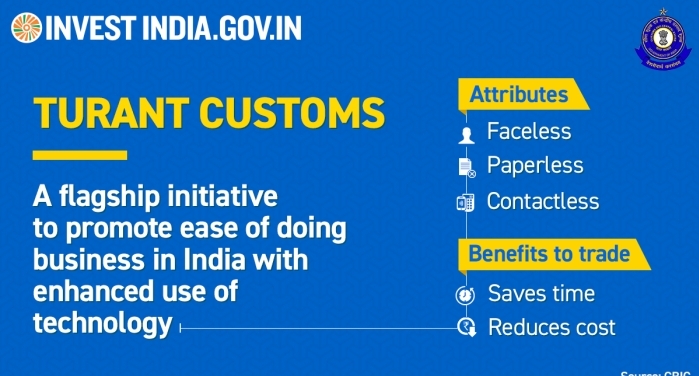CBIC announces pan-India rollout of faceless Turant Customs
September 8, 2020: Central Board of Indirect Taxes & Customs announced the all-India roll out of its faceless, paperless & contactless customs clearance programme Turant Customs.

September 8, 2020: Central Board of Indirect Taxes & Customs announced the all-India rollout of its faceless, paperless & contactless customs clearance programme Turant Customs.
The pilot programme of faceless assessment was launched in Chennai on August 14, 2019, for primarily electrical machinery falling under chapter 85 of the Customs Tariff Act, 1975. This pilot programme was subsequently expanded to Ahmedabad, Bengaluru, Delhi, Mundra and Visakhapatnam for goods primarily falling under chapters 39, 84, 86 to 92, 72 to 83 and 50 to 71. These pilot programmes helped test faceless assessment, first in the same zone (e.g. imports at Chennai seaport and air-cargo were assessed by customs officers in either location instead of only in the port/air-cargo of import) and then across zones (e.g. imports at Chennai sea/air-cargo were assessed by customs officers at Bengaluru air-cargo/ICD and vice versa).
These pilot programmes were followed by the launch of phase I of faceless assessment on June 5, 2020, cutting across the customs formations in Chennai and Bengaluru for articles primarily falling under the Chapters 84 and 85. Phase II of faceless assessment, which was begun on August 3, 2020, at customs formations in Chennai, Bengaluru, Delhi, for goods falling under the chapters 50 to 71, 84, 85 and 86 to 92 and at customs formations in Mumbai, for goods falling under the chapter 29.
“This includes faceless or anonymised assessment, self-registration of goods by importers, automated clearances of bills of entry, digitisation of Customs documents, etc. The objectives sought to be achieved are exponentially faster clearance of goods, the reduced interface between trade and Customs officers and enhanced ease of doing business. The phased launch of the Turant Customs programme in select ports of import was aimed at testing in a real-life environment, the IT capabilities as well as the responsiveness of the trade and Customs officers to the various initiatives,” said the CBIC notice.



